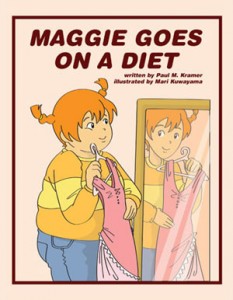
By Emily Mathis
A new book titled “Maggie Goes On a Diet” is hitting bookstores everywhere and causing quite a stir. “Do little girls need a diet book?” asks Salon.com. That is the question. With childhood obesity rates close to 1 in 5 children, it’s not surprising that someone would write a diet book for children. But is that the right way to go?
“Maggie Goes On a Diet” follows Maggie, a 14-year-old overweight girl, through her weight loss story. According to the publishers: “Maggie has so much potential that has been hiding under her extra weight.” The publishers call the story of a girl who loses weight and becomes a soccer star, “inspiring”. But inspiring is not the word many would use to describe this story.
Already forums on Amazon.com are blowing up with outraged customers, and the book has yet to be released. Some call the book an “abomination” and some customers even threaten to take their business elsewhere if the book is sold on Amazon. Valid points are being brought up about how easy it is to trigger eating disorders, especially in girls.
In fact, according to The National Eating Disorders Association, “42 percent of girls in 1st – 3rd grades want to be thinner”, and “over one-half of teenage girls and nearly one-third of teenage boys use unhealthy weight control behaviors such as skipping meals, fasting, smoking cigarettes, vomiting, and taking laxatives”. With nearly 10 million girls and women suffering from eating disorders, it’s no wonder people are up in arms about a diet book whose targeted audience is 4 to 8 year olds.
Having experienced being overweight as a child myself, I fear reading a book like this during that period might have steered me down the wrong path. Too many girls already struggle with low self-esteem and lack of confidence, especially about how they look. A book that shows being fat basically means you can’t be happy with yourself, and being thinner equates to having more friends and being the star of the soccer team; well, that’s just asking for problems.
Girls need books that talk to them about acceptance of differences, of each other, and especially of themselves no matter what. “Maggie Goes On a Diet” is just another example of the media trying to fit girls into a certain image. Maybe instead of publishing books about dieting, the publisher should think about publishing books that promote healthy body image.
Totally agree with Emily……well stated!!
Playing devil’s advocate here. With over 1/3 of American children either obese or overweight, why should a picture book about losing weight be off-limits? As a former fat kid myself, I would have liked to have had a book like where the heroine was facing the same issues as I and was taking practical steps to improve her situation. Clearly I haven’t read the book — since it hasn’t been released yet, I’m assuming that the blog writer hasn’t either — and if its message truly says “lose weight and you’ll be more popular and people will like you better” then, yeah, that’s horrible. But if it’s saying “lose weight and you’ll play soccer better”, then that seems like a fairly realistic statement to me, and one that could be a healthy motivator for kids to eat better.
Mary-Thanks for reading and commenting! I understand where you are coming from. I think that the main problem I have with the book so far-like you said I haven’t read it yet- is the title and front cover. I just think ‘diet’ is a strong word and showing an image of a girl looking in a mirror and seeing the skinnier version of herself sends the wrong message. Also, I think that a book is not the best way to change the problem of childhood obesity- I think that comes from changes in society and our school systems. Plus I know that some kids even if they are healthy are bigger than normal and that can be hard so I think books that promote self-acceptance rather than a book like this would be better. Thanks again for playing devil’s advocate!
Comments are closed.